Know the intriguing connection between Jeremiah 10:3-4 and Christmas trees in our enlightening Bible exploration.

What Bible Verse Talks About Christmas Trees
Peeling back the layers of the Bible can often feel like embarking on a treasure hunt, each verse holding its own hidden meanings and interpretations. As you sift through the pages, you might wonder if there's a verse that talks about Christmas trees, a symbol that's become synonymous with the holiday season.
Jeremiah 10:3-4 is often cited in this context. Yet, as we delve into the scripture, we realize it's not as straightforward as it seems. So, is this verse really about Christmas trees, or is there more to uncover? Let's embark on this journey to discover the truth.
Key Takeaways
- The Christmas tree tradition, symbolizing eternal life and divine love, originated in 16th century Germany among devout Christians.
- Biblical references to trees, like the 'Tree of Life', often represent life, growth, and spiritual connection.
- Jeremiah 10 condemns idolatry involving trees, but does not directly relate to modern Christmas tree traditions.
- The Christmas tree's symbols, including its shape, lights, and topper, signify aspects of the Christian faith, despite not being mentioned explicitly in the Bible.
Historical Origin of Christmas Trees
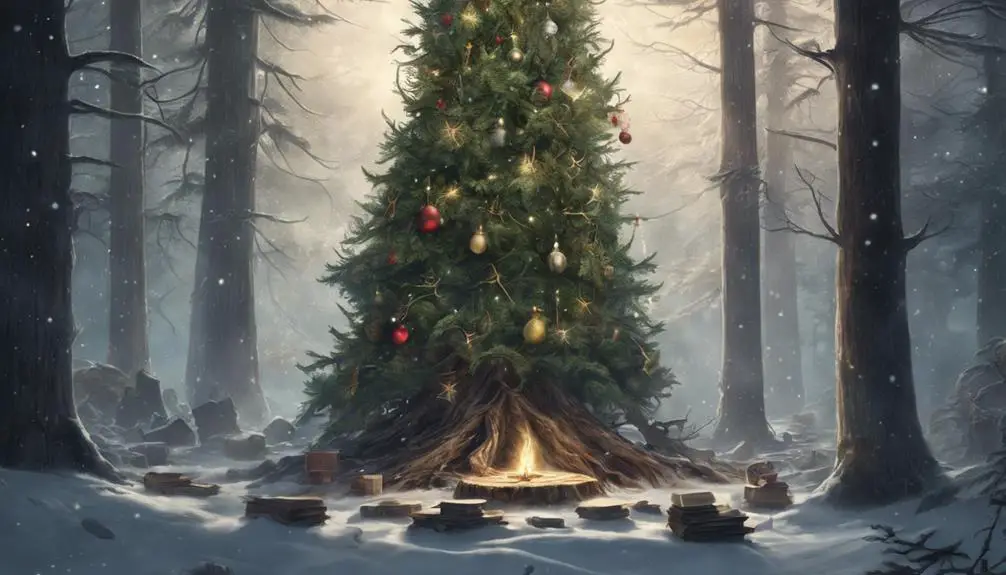
Delving into the historical origin of Christmas trees, you'll find that this tradition, deeply rooted in faith, dates back to Germany in the 16th century. Here, devout Christians began the practice of decorating evergreen fir trees to celebrate Christ's birth. The evergreen, an enduring symbol of eternal life, represented the everlasting love and grace of God for humanity.
It wasn't until the 19th century that the tradition crossed boundaries and reached American soil. You might be surprised to know that early Puritan settlers weren't fans of this German custom. They viewed it as a frivolous pagan ritual. However, as the years passed and more immigrants from different parts of Europe arrived in America, they brought with them their cherished customs, including the Christmas tree.
The Christmas tree, now adorning homes worldwide, has become a universal symbol of Christmas. We need to remember that its roots are firmly planted in faith. As you set up your Christmas tree this year, take a moment to appreciate its rich history. It's not just a festive decoration, but a beautiful reminder of God's eternal love for us.
Biblical Interpretations of Trees
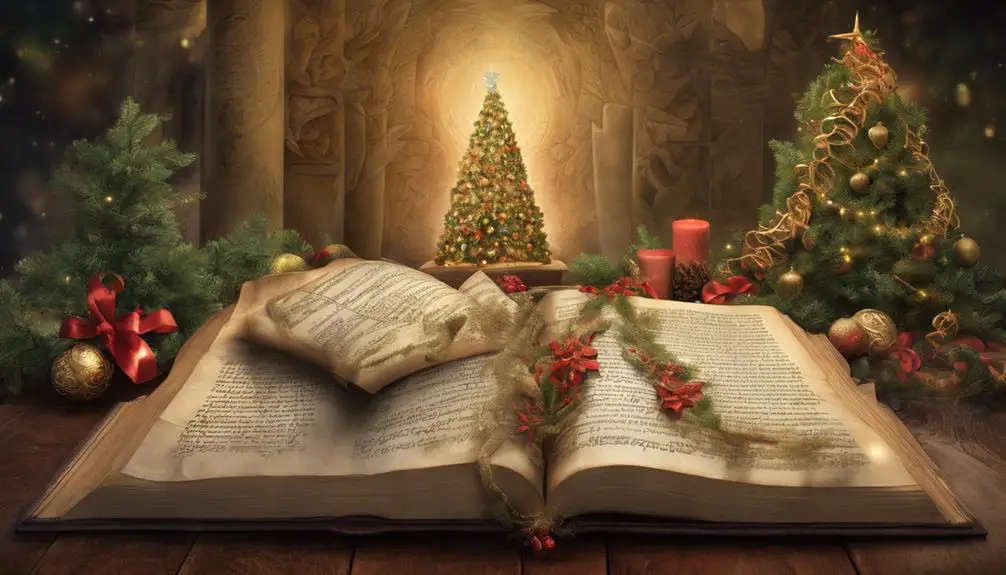
Continuing our journey into the spiritual significance of the Christmas tree, let's explore the biblical interpretations of trees, and understand how they contribute to the religious essence of this festive symbol. Trees are frequently mentioned in the Bible, often symbolizing life, growth, and connection to God.
You've likely read about the 'Tree of Life' in the book of Genesis. This tree, situated in the Garden of Eden, represents eternal life, a gift that God promises to those who remain faithful. Similarly, the 'Tree of the Knowledge of Good and Evil' signifies the complexities of moral judgment and the human capacity for choice.
In Psalms, believers are compared to trees planted by streams of water, indicating spiritual vitality and fruitfulness. The mighty cedar of Lebanon, mentioned in Psalms and Proverbs, symbolizes strength, longevity, and majesty, attributes often ascribed to God Himself.
It's important to note, though, that while trees carry deep symbolism in the Bible, none specifically represent the Christmas tree as we know it today. However, you can see how the general theme of life, growth, and divine connection embodied in biblical trees resonates with the spirit of the Christmas season.
The Controversial Verse: Jeremiah 10
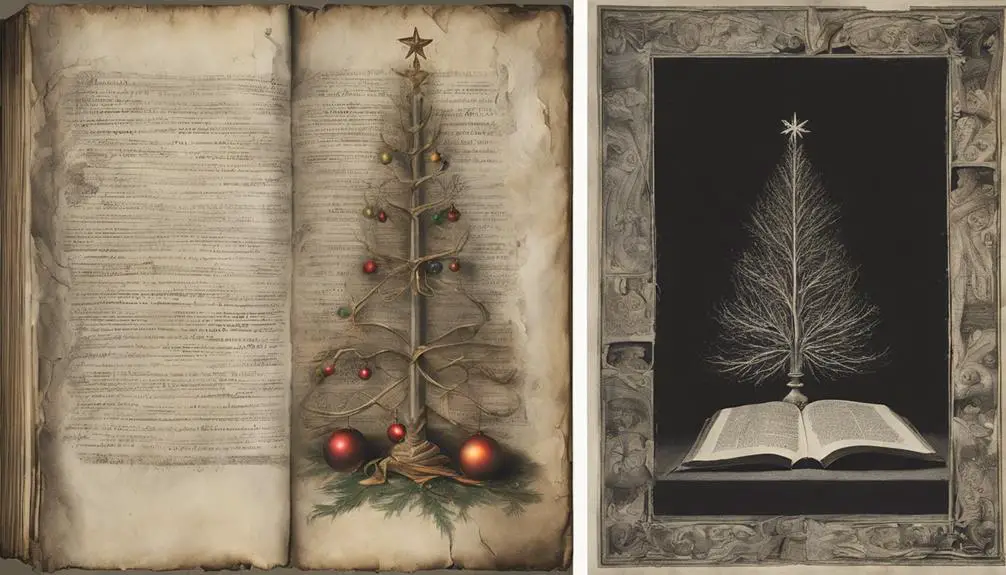
Let's turn our attention to Jeremiah 10, a verse sometimes brought into the discussion about Christmas trees due to its controversial interpretation. This verse describes people cutting down trees, adorning them with silver and gold, and fastening them so they will not topple. Some interpret this as an outright condemnation of Christmas trees.
However, you must note that Jeremiah was speaking into a specific cultural context, addressing pagan idolatry common at the time. He wasn't commenting on a modern Christmas tradition. It's important to read scripture in its proper historical and cultural context.
Jeremiah 10: Verse |
Common Interpretation |
Contextual Interpretation |
|---|---|---|
Verse 2 |
Warning against pagan customs |
Warning against following heathen nations |
Verse 3 |
Condemning tree-cutting |
Criticizing idolatry |
Verse 4 |
Against decorating trees |
Against worshipping idols |
Verse 5 |
Trees can't move or speak |
Idols have no power |
Thus, Jeremiah 10 doesn't directly reference Christmas trees. It's a caution against idol worship, something fundamentally different from the Christmas tree tradition. As you navigate this topic, remember to engage with scripture thoughtfully, considering its original context and purpose.
Understanding Symbolism in The Bible

In light of the discussion around Jeremiah 10, it's clear that symbols hold a powerful place in the scriptures. They aren't just mere representations, but vessels of profound spiritual truths. As you delve into biblical text, you'll encounter a rich tapestry of symbolism, each one intricately woven to express a divine truth.
Water, for instance, symbolizes cleansing and spiritual birth in scriptures such as John 3:5. Bread, as seen in Exodus 16, represents sustenance and God's provision. Even colors carry symbolic significance: white often denotes purity, while red can signify sacrifice.
However, interpreting these symbols requires discernment and a careful study of the context. You can't isolate a symbol from its biblical setting and impose your own interpretation. A snake, for example, can represent both evil (Genesis 3:1) and healing (Numbers 21:6-9) depending on the context.
Christmas Trees and Christian Beliefs
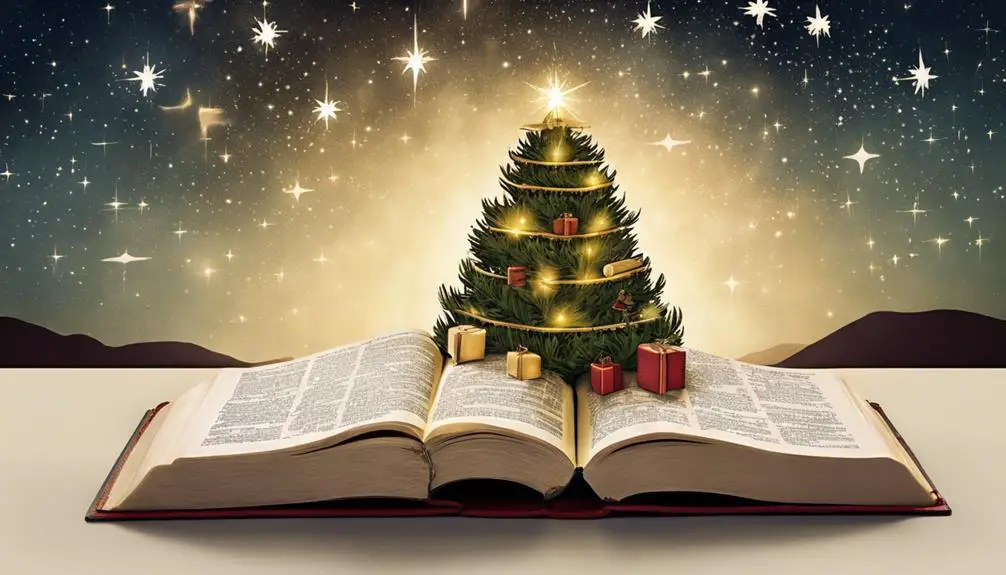
While you may hang ornaments and lights on your Christmas tree each year, have you ever pondered its spiritual significance in Christian beliefs? It's not just a festive decoration, but a profound symbol that carries deep Christian meanings.
The evergreen fir tree, traditionally used as a Christmas tree, symbolizes eternal life in Christ. Its triangular shape points upward towards God and signifies the Holy Trinity. The lights you hang on your tree aren't merely for sparkle; they represent Jesus as the Light of the World. The star or angel you may place on the top is a reminder of the Star of Bethlehem or the angels who announced Jesus' birth.
However, it's crucial to note that while these symbols can enhance your celebration and understanding of Christmas, they're not explicitly mentioned in the Bible. The Bible doesn't directly refer to Christmas trees, but it does talk about trees and their symbolism in various passages. Remember, the heart of Christmas isn't in the tree, but in the birth of Jesus Christ, God's gift of love and salvation to mankind.
Conclusion
So, you've learned about Christmas trees' historical origins and their biblical interpretations. You've delved into Jeremiah 10, shedding light on the controversial verse.
Understanding symbolism in the Bible has been explored and you've seen how Christmas trees fit into Christian beliefs.
As you celebrate the season, let your tree be a symbol of your faith, hope, and joy in Christ's birth, embracing the rich traditions and deep spiritual significance it holds.

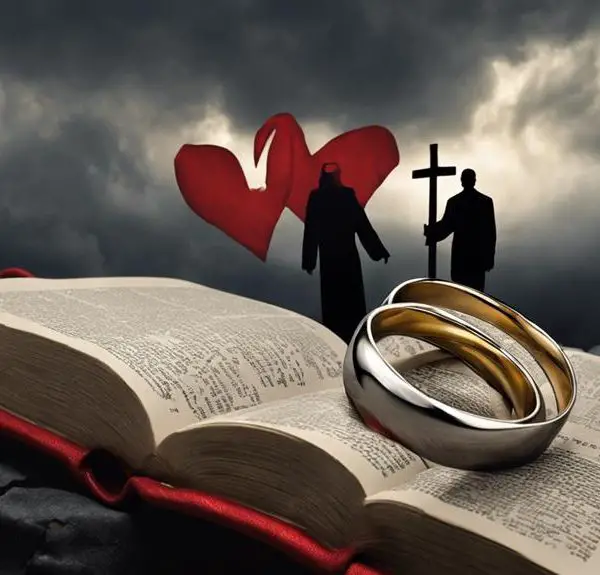
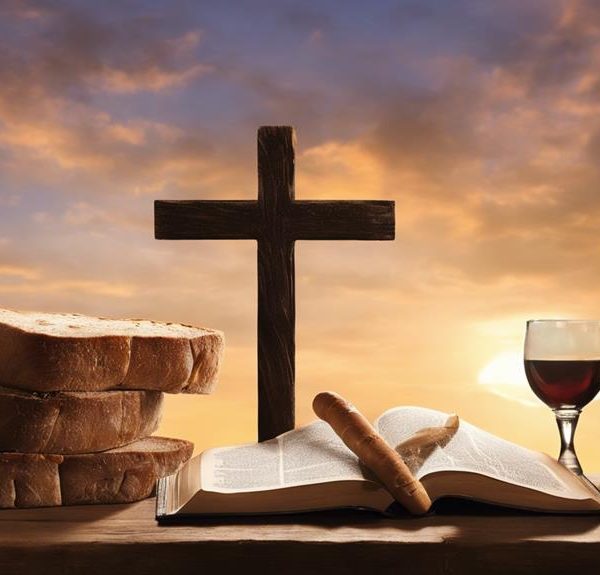
Sign up